By Stephanie Doctrow, RP Staff, on Thu Aug 18, 2011 at 12:00 PM ET London is burning, and no one knows why.
It’s been a week since anarchy took over the city of London and some of its suburbs. The cause: the wrongful shooting of a man in a poor neighborhood. But it seems as if the protests aren’t even about that anymore. Gangs are looting every store in sight and carrying out TVs and computers. Historic buildings that have been around since World War II are now piles of ash and rubble. One particularly harrowing YouTube clip shows a group of people helping a crying, injured child– while simultaneously stealing everything out of his backpack. The violence is still going, with no sign of stopping.
I won’t pretend to have the answers to a massive political conflict; this is Politics-Free Week at The Recovering Politician, after all. What matters is that this destruction is tearing apart one of the most amazing places in the world. Here’s my love letter to London, the historic, diverse city that many of us know and love.
Read the rest of…
Stephanie Doctrow: London’s Burning
By Rod Jetton, on Mon Jul 25, 2011 at 8:30 AM ET 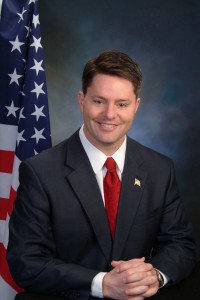 So far I’ve told you how I rose to power, changed our state, and lost control of my personal life. (Click here for Part 1.) Click here for Part 2.) So far I’ve told you how I rose to power, changed our state, and lost control of my personal life. (Click here for Part 1.) Click here for Part 2.)
This concluding post will complete the story of how I finally got my life back on track.
I don’t know if you believe in God or not, but I DO! In December of 2009, God finally had enough of my wayward ways and allowed my choices to get me into a situation that only he could help me through.
After spending the night with a lady I had reconnected with on Facebook, I was charged with felony assault. The press, along with my enemies, had a heyday, and I immediately shut my consulting business down.
Soon after that, I was notified that I was a target of a federal grand jury investigation surrounding my handling of a bill in the 2005 legislative session.
Needless to say I started 2010 broke, with no job, very few friends and lots of time on my hands. As bad as my troubles were at the time, looking back now, I’m thankful for them. Life passes by so quickly, and very few of us get the chance to sit down and contemplate what is important. My troubles gave me a chance to analyze my bad choices and personal weaknesses.
With my pride stripped away, I was able to honestly evaluate my past actions. I saw how foolish I had been to put my family on the back burner. I learned how bitterness toward my enemies had made me a bitter person to everyone around me. The hardest thing for me to admit was that I wasn’t the same friendly and caring guy who had gone to Jefferson City in 2000.
Read the rest of…
Rod Jetton: Success, Scandal & Change, Part 3-Downfall and Renewal
By Jonathan Miller, on Mon Jul 18, 2011 at 8:30 AM ET My column this week for The Huffington Post serves as tribute to a special friend of mine with a famous name and a powerful story. The “other” Diana Ross suffered an unspeakable tragedy, but she’s survived to demonstrate incredible strength and to fight for a critical cause — battling the scourge of domestic violence.
Read the excerpt below:
When my friend Terrell Ross first introduced me to his wife, I struggled to stifle a chuckle.
Diana… Ross? C’mon!
Her famous name seemed even more ironic as I came to know her. Quite in contrast to her brash diva namesake, the “other” Diana Ross was soft-spoken, kind, and demure.
Only more recently did I learn that Diana’s outward modesty belied an extraordinary inner fortitude.
In October 2006, Terrell — her beloved husband of more than three decades — died after a much-too-quick battle with a particularly pernicious and virulent strain of cancer.
And then just three years later, on September 11, 2009, her youngest daughter Amanda, aged 28, was brutally murdered by her ex-fiancé, just a few hundred yards from where Diana was gardening at her home in Lexington, Kentucky.
Because the killer, Steve Nunn, was a well-known politician — a former state legislator and gubernatorial candidate, as well as the son of a former governor — a local media melée erupted. Nunn was quickly apprehended, Amanda was buried among much pomp and circumstance, and politicians raced to introduce legislation to honor her memory.
Click here to read the full column.
By Jonathan Miller, on Thu Jun 9, 2011 at 8:30 AM ET This week, The Recovering Politician published three pieces in which contributing RPs Jeff Smith, Artur Davis, and I weighed in on the John Edwards investigation and trial. If you missed them, here they are:
Jonathan Miller: I Was Never a John Edwards Fan, But I’m Rooting for Him Now
Artur Davis: Former Federal Prosecutor Terms Edwards Investigation “Misguided”
Jeff Smith: Your Tax Dollars at Work, Prosecuting (and Potentially Incarcerating) John Edwards
These articles certainly touched a nerve. I received several dozen emails from our readers, each giving their own take on the controversy.
Below I run a sample of the readers’ letters. Since I did not ask explicitly for permission, I am not using the authors’ names. However, if I used your email, and you would like to be identified, please let me know.
And of course, as always, we encourage you to comment below.
Is what John Edwards's campaign did against the law? That's the
question, right? It's not about the character of John Edwards, or at
least shound't be. And as for the poor first-time candidate worried
about taking it on the chin because he copped a few free haircuts or
some used clothes, wouldn't he want to know one way or the other
whether it's okay before he takes a gift? The commentary I have seen,
like that cited on your blog, doesn't say one way or the other whether
what happened here is or isn't (or should or shouldn't be) against the
law, but rather (i) leave the poor guy alone and (ii) what's the big
deal? History is full of powerful people who left the stage in shame
and then still had to suffer being investigated, sued, and/or
prosecuted. It's a risk that goes with being a public person with
something to hide. In Edwards' case, these were large donations (not
free haircuts), and if whether they should have been disclosed because
they served a political purpose is an open question, then let's get
the answer. Doing so would hopefully shed some light on what is
obviously a murky area, and may help deter some future shenanigans.
Someone will always be ready to push the envelope. If the edge is not
well defined, or worse, the signal is sent that we won't pursue cases
of apparent wrongdoing that are near the edge, we open the door to
even worse behaviour in the future.
John Edwards’ approval ratings are between 2 % and 3%. I hope he will never be considered for public office again. I think he is lower than dirt for his arrogant, narcissistic, dishonest acts against his dead wife and his children. His character is too low for him to be considered for any responsible government job. If he has broken laws in his covering up his out-of-wedlock child and lover, I would not shed a tear if he went to jail or was forced to do public service for indigent wives whose husbands have left them for the healthy, years younger model. I sent money to this man’s campaign, and it was NOT sent to support a mistress and baby outside of marriage! Poverty for John Edwards seems to me the best punishment.
Numerically, the Republicans seem to be cranking out more reprobates, liars, adulterers, thieves, and liars, but Democrats had better police their own if they want to count themselves as those taking the “high ground.”
Read the rest of…
The Edwards Affair — Our Readers Weigh In
By Jeff Smith, on Tue Jun 7, 2011 at 12:30 PM ET 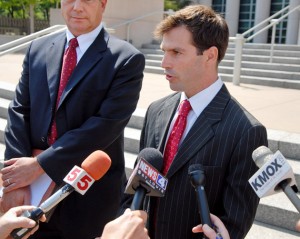
If John Edwards goes to prison, then many other politicians should join him, according to the Department of Justice’s logic.
I have a friend, for instance, who during his first campaign unintentionally did almost exactly what Edwards did. After my friend’s first campaign event, the host pulled him aside and said, “Great job! But, can I be candid with you?”
“Sure.” Sure, he said, wondering if his rhetoric had been too strong for some in the room.
“OK. Please don’t be angry,” she said. “But people think you look like a kid, not somebody who could be in Congress. Your suit’s too big. Your shirt is threadbare, your slacks look like rags, and your shoes are scuffed. Basically, you like a boy in your dad’s hand-me-downs. Oh, and you really need a haircut. Your hair looks like a hornet’s nest. You‘ve gotta go see my girl Melissa, she can help you.”
My friend went to Melissa for the duration of the campaign, and her handiwork was by all accounts a huge improvement. Melissa refused to charge him, no matter how vehemently he tried to pay her.
A few weeks later my friend ran into his high school tennis coach, who also commented on his suit. “You can’t go around looking like that,” said the coach, and gave my friend several stylish suits and blazers that he hadn’t worn in years, with instructions on where to get them altered.
Little did my friend know that he had his own Bunny Mellon and Fred Baron, on a slightly smaller scale. And like John Edwards, he neglected to report these gifts on his FEC filings. (FEC rules state that any gift to a federal candidate that is meant to influence an election and which has not been given routinely prior to the benefactor’s candidacy must be reported.)
But if Lanny Breuer, the Assistant AG who is prosecuting John Edwards, has anything to say about it, there will be a precedent set for candidates, even those like my friend – neophytes who know precious little about the intricacies of federal campaign finance law. Any failure to report such gifts would merit a felony charge and, potentially, prison time.
***
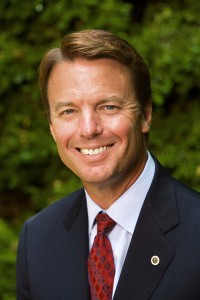
Let’s lay out a few pertinent facts about the Edwards case.
A centenarian billionaire gave almost a million bucks to help him hide his pregnant mistress while he ran for president. Edwards failed to inform his campaign treasurer about these gifts.
Who was hurt here – other than Elizabeth Edwards?
We can agree that John Edwards make a mistake by succumbing to the “charms” of a bleach-blonde New Age party-girl who approached him (“You’re so hot”) at a NYC hotel bar one evening. And he compounded this initial mistake with many more along the way. By carrying on an affair as his wife’s cancer progressed, he was appallingly self-indulgent and callous. By running for president while concealing it, he became one of the highest-stakes gamblers in history, literally risking the nation’s well-being on a Houdini-like escape from this tangled web.
But that doesn’t mean the government should have spent two years and millions of dollars to prosecute him.
The crux of the case is that Edwards failed to report the “gifts” as campaign contributions. However, no Bunny-money ever touched any of John Edwards’s campaign or personal accounts. Prosecutors don’t even allege that it did. And apparently Ms. Mellon even paid gift taxes on the money. So should Edwards really be prosecuted and potentially incarcerated for misleading his campaign staff about the fact that a billionaire kept his mistress living in style?
Is there anyone in the country who doesn’t think John Edwards is a world-class heel? Probably not.
Would you like to help pay the millions of dollars for his prosecution and possible incarceration? I didn’t think so.
***
As regular readers know, I lied to federal agents about my knowledge of a postcard that was mailed out by an independent group during my 2004 congressional campaign. With my knowledge, one of my aides had given publicly available information about my opponent’s legislative attendance record to the independent operator, a fact that my aides and I hid from investigators. The wire worn by one of my best friends for two months in 2009 revealed my awareness of the plan to send the mailer, along with the fact that I frequently use four-letter words.
Read the rest of…
Jeff Smith: Your Tax Dollars at Work, Prosecuting (& Potentially Incarcerating) John Edwards
By Artur Davis, on Tue Jun 7, 2011 at 8:30 AM ET  Let’s stipulate that John Edwards’ misdeeds are already legendary. Whatever your view of the linkage between sexual misconduct and public life, Edwards picked an usually sordid path to travel–the betrayal of a dying spouse, the failure to own up to a pregnancy, and a political cover-up that traded on the loyalty of people who believed in him deeply. Let’s stipulate that John Edwards’ misdeeds are already legendary. Whatever your view of the linkage between sexual misconduct and public life, Edwards picked an usually sordid path to travel–the betrayal of a dying spouse, the failure to own up to a pregnancy, and a political cover-up that traded on the loyalty of people who believed in him deeply.
But sin is still not criminal, and I am in the camp that thinks the prosecution of Edwards last week is misguided.
These are the basic facts around the case: in 2007 and 2008, several major Edwards donors funneled just under a million dollars to Edwards for the purpose of paying off Realle Hunter, Edwards’ mistress, in the hope that she would remain silent about the affair. The Edwards campaign did not disclose the money in its quarterly FEC filings, and there has been much subsequent wrangling over whether they should have.
Whether the money should have been revealed turns largely on how it is classified: gifts need not be reported to the FEC, campaign contributions must be. If the funds had a political purpose like preserving Edwards’ candidacy from scandal, they are arguably campaign contributions. If they were political, they also might be what campaign law calls independent expenditures, and in that case, it would be a campaign finance law violation if Edwards “coordinated” the expenditures in any way.
 The Edwards camp responds that the money, which came from two longtime friends of the former Senator, was a personal gift meant to help Edwards by shielding his wife and family from finding out about the affair. In its charging, the Department of Justice contends that the Edwards team is wrong and that its receipt of the money, which is way outside the legal limits for individual contributions, and its subsequent failure to disclose it, are criminal violations. Edwards alone has been charged. The Edwards camp responds that the money, which came from two longtime friends of the former Senator, was a personal gift meant to help Edwards by shielding his wife and family from finding out about the affair. In its charging, the Department of Justice contends that the Edwards team is wrong and that its receipt of the money, which is way outside the legal limits for individual contributions, and its subsequent failure to disclose it, are criminal violations. Edwards alone has been charged.
Again, a concession is in order: a candidate’s receipt of sizable amounts of money from a few sources is not a good thing for those of us who worry about the sway big money donors have on politics. Moreover, the idea that money has either a “political” or a “personal” purpose is a rather obvious fiction: keeping an extramarital affair out of view helps save both a marriage and a political career.
But imagine a scenario that is slightly less salacious. Let’s say a major cable television network pays a potential presidential candidate a significant salary to host a program on public affairs, and regularly features that candidate as a commentator on its other programming. The candidate has no previous experience as a journalist and the show performs poorly enough in the ratings that the network derives little benefit. Is this generosity a campaign contribution, on the grounds that the free time and the salary boost the candidate’s presidential interests in obvious ways, and spares him the inconvenience of a day job? Or is it just an act of kindness meant to sustain a figure whose views are shared by the network’s management?
Read the rest of…
Artur Davis: Former Fed. Prosecutor Calls Edwards Prosecution “Misguided”
By Jonathan Miller, on Mon Jun 6, 2011 at 2:15 PM ET John Edwards’ indictment last week is an issue that will occupy the blogosphere and the political chattering class for months.
And it’s one to which we will be devoting considerable attention here at The Recovering Politician.
For the Edwards affair touches on a significant number of issues that are of primary concern and interest to our contributors and our readership: the privacy rights of public figures; the criminalization of politics; the special responsibilities of our state and national leaders.
My take on the issue is fairly simple. While I have never been much of a fan or supporter of Edwards, and while I find the cover-up scheme for which he was charged to be reckless, irresponsible, and farcical; I oppose his prosecution, and I am hoping that he will escape criminal punishment.
I published an essay on my views in today’s Huffington Post. Here is an excerpt:
I really wanted to like John Edwards. I just couldn’t help myself.
From the time of his first presidential bid, Edwards’ focus on poverty reduction and his sublimely poetic identification of “two Americas” perfectly captured my own communitarian vision of politics and public service.
But I couldn’t support him. There was just something about him.
I wish I could say it was because I suspected the arrogance and recklessness that led him to risk the Democratic Party’s fortunes – indeed, the fate of the country — on an implausible scheme to cover-up the paternity of his child. But I wasn’t that insightful.
Only recently, upon reflecting on my own political career, did I understand what it was.
To read my complete essay, please click here.
And please stay tuned to The Recovering Politician for a wide variety of different opinions on the Edwards scandal.
By RP Staff, on Wed Jun 1, 2011 at 12:00 PM ET Our very own contributing RP Artur Davis offered his insights on the ongoing John Edwards scandal to Politico’s Ben Smith. In addition to being a member of the House Judiciary Committee while in Congress, Davis previously served as an Assistant United States Attorney in Alabama, with a nearly 100% conviction record.
Here’s what Davis had to say about the Edwards affair:
It’s a new low for Edwards stemming from his affair with a former campaign aid, and at least one knowledgeable observer thinks any charges brought may be off the mark. Artur Davis, a former federal prosecutor and four-term Alabama congressman, says that an Edwards indictment would be highly unusual by normal Justice Department standards.
“Campaign finance law gives candidates significant leeway on how to spend campaign dollars, as long as the money does not end up in their own pocket,” says Davis, a former member of the powerful House Judiciary Committee and now a partner in the white collar and government investigations practice at law firm SNR Denton in Washington.
“It is exceedingly rare for the government to bring criminal charges in connection with the misuse of campaign dollars; when it happens it usually involves some other crime like obstruction or making false statements to investigators. Those elements seem to be missing here,” Davis adds.
Click here to read the full article in Politico.
By Jeff Smith, on Wed May 25, 2011 at 8:30 AM ET 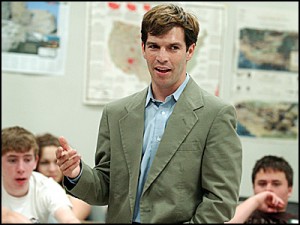
Lies can have unpredictable trajectories.
Sometimes, a stupid lie that seems inconsequential at the time – in my case about a campaign postcard – can lead to betrayal, the end of a friendship, and a prison term. Other times, a stupid, inconsequential lie can lead to the blossoming of a long and meaningful friendship.
***
During my first Senate session in early 2007, I drove to Louisville for the weekend to visit my ex-girlfriend, who served as press secretary for Kentucky gubernatorial candidate Bruce Lunsford. It was the weekend before the Democratic primary, and on Sunday afternoon before I headed back to St. Louis, we stopped at a restaurant which we soon realized shared a patio with an adjacent restaurant hosting a campaign BBQ for one of her gubernatorial campaign opponents, Kentucky House Speaker Jody Richards.
Lis, whose jet-black hair, pale skin, haute couture dress, and staccato delivery screamed New York City, hid her head in her hand. “Oh my God,” she said, “they’re totally gonna recognize me and think I’m tracking them. Ohmigod, this is so embarrassing. Let’s get the fuck out of here.”
Although most people in St. Louis politics viewed me as a Type A politician, who sprinted door-to-door and whose campaign aides who worked 16 hours a day seven days a week, I tended to take a much more relaxed view of campaigns than Lis did. A year earlier, she had famously called my campaign manager and berated him for failing to blind-copy a group of reporters on a routine press advisory. I’d watched the call from his side in the office; he stood there, mouth agape and crumpling like a boxer taking gut punches, for 60 seconds while the office listened to her tear into him, the phone a safe distance from his ear.
Knowing her aversion to even the smallest gaffes, I mischievously decided, as was my wont, to antagonize her. “Hey, I’m gonna go meet Jody,” I said, rising from the table. As a politician, a political scientist, and a huge geek, I liked meeting and analyzing politicians. The only thing better than meeting and analyzing them was to do it undercover.
Lis trembled and turned ashen. “Do NOT do that. Ohmigod I will fucking KILL you if you do that! Let’s just get the check and get out of here.”
***
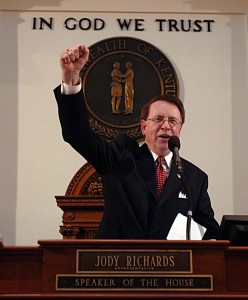 Former KY House Speaker Jody Richards I rose from my seat and approached Richards. “Hey, Mr. Speaker, how’s it goin’?”
He clasped my outstretched hand and pumped it furiously. “Hey there, young fella, how ya doin’?”
“I’m great. How’s the campaign going?”
“Well, pretty dern good!” He gestured to the patio, where an embarrassingly small group of supporters had gathered for the BBQ. “Look at all these folks! I’d say things are pretty dern good! What’s yer name, young fella?”
“John,” I lied.
He reached out and pumped my hand some more. “It’s great to see ya, John. Where ya from?”
“Oh, right down Bardstown,” I replied, gesturing vaguely to my left, praying he wouldn’t pursue that line of inquiry any further. I needed a distraction, fast. “So, tell me about your platform.”
Read the rest of…
Jeff Smith: When “John” Met John Y.
By Jason Atkinson, on Mon May 23, 2011 at 8:30 AM ET When I raced in Belgium in 1992, I thought I was finally on the verge of breaking into the highest levels of cycling. I came home to Oregon, back to skiing, got run over by a bubble-gummer driving her Daddy’s Chevy Blazer and ended up in politics. Through it all, I have remained a complete lover of cycling.
As I write, the Lion of Flanders flag is a mast over my farm. I put it up for the Tour of Flanders; keep it up for the Paris–Roubaix (the greatest bike race of the season) and through the Grand Tour seasons. My son, when he was barely able to speak complete words, could say the name Paolo Bettini in perfect Italian, Paolo was the World Champion in 2006 and 2007.
I saw doping first hand. Racing on the German – Austrian border I recall seeing two Czech development riders for team Banesto take out syringes during a race and shoot up. What as amazing about this was not the openness, but the herculean speed they had about twenty minutes later. My team had four riders at the Olympic trials that year. We were not the strongest, but certainly a team deep with talent and these two dopers dropped us.
In all the reports from that era, doping was really getting widespread and more sophisticated than the rumored amphetamine use during the 1970’s. Greg LeMond, a three time tour winner, first American game changer and gun shot survivor, commented in the early 1990’s, in the waning years of his career, how cyclists were gaining incredible strength. He was openly criticized for being grumpy and past his prime, but I believed him. LeMond was a man God designed to win bike races. Even in his late 30’s, someone as good as him just does not get dropped.
 Lance Armstrong and Marco Pantani My sport has widespread doping scandals, but I remained true. The Festina mess, then Marco Pantani, “the Pirate.” I have always given the benefit of the doubt, because unlike American team sports where people are elevated with gigantic professional contracts and grow enormous egos based on them, Cyclists rarely make over $100k ($45k for a domestique in the 1990s) and in order to reach those levels cyclists spend years of countless miles training alone. Cyclist loves their sport deeply like few athletes in other sports do. There is never an off-season.
I was hit hard when Pantani was found dead in his hotel room after an overdose. He and I were almost the exact same age. I had seen him race. He was amazing. After the scandals he left cycling and fell deep into depression. I felt for him as a depressed man looking for redemption.
When the allegations surrounding Tyler Hamilton surfaced, I was among the first to sign his web-site’s
 Tyler Hamilton comments section and encourage him to stand strong. More than his Olympic victory, his solo win in the mountains during the 2003 Tour de France with a broken collarbone was perhaps the greatest testament to mind over pain and the love of cycling I had ever seen. When he made his comeback winning the US Championships by a hair’s breath, my son and I were yelling in victory at our TV.
Last night, some of the shine rubbed off as Hamilton came clean on 60 Minutes. It’s another sad day for the sport I love and will again be a necessary cleansing agent. Other sports and their heroes – with far more money in play – are protected, but professional cycling is unique culture around the world and needs to be cleansed.
We Americans marvel and do not quite understand all the hoopla surrounding World Cup Soccer and why the teams and countries are exalted over individual players and multimillion dollar shoe contracts. In the same vein, we don’t fully appreciate professional cycling either. That is why it is hard to grapple with Lance Armstrong.
Like I have, I will remain true and give the benefit of the doubt to Lance Armstrong. I want to believe Lance did not use banned substances. I want to believe in cycling. The 60 Minutes piece was hard for me to watch, and we will all focus on the individual hero, but that is not the sport of cycling.

Five feet away, across my desk – hanging on the wall of my office – is a photo of Governor Schwarzenegger, Governor Kulongoski, myself and my son signing legislation to protect a river that my little boy is the fifth generation to grow up on. I was so proud that day and had the picture made to give my boy when the responsibility to care for the river becomes his. Just like cycling, how do I look at the picture now?
Cycling will still need its heroes next year. My river will still be there in thirty years and will still need her champions. All we want is for both to be clean and protected.
|
The Recovering Politician Bookstore
|

















